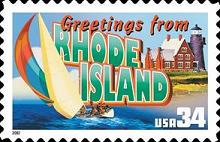 If you haven't read part 1 of my series on the history of Rhode Island's border disputes with Massachusetts, now would be a good time to do so. It might also be a good time to read Lefty's examination of the issue from the Massachusetts side as well.
If you haven't read part 1 of my series on the history of Rhode Island's border disputes with Massachusetts, now would be a good time to do so. It might also be a good time to read Lefty's examination of the issue from the Massachusetts side as well.Despite the acquisition of a royal charter from King Charles II, the demarcation of the Eastern Rhode Island border remained in dispute. When petitioners from Rhode Island informed the King that Rhode Island's neighbors were coveting land granted in the original charter, the King graciously granted Rhode Island a new patent in 1693 extending Rhode Island's boundaries to include land "three miles east and northeast" of Narragansett Bay, despite the existing claim to this land by Plymouth Colony. When Plymouth protested, the King appointed a survey commission to settle the dispute. Unfortunately for Rhode Island, the commission found in favor of Massachusetts.
The border remained the same after Plymouth Colony merged with Massachusetts in 1691. In 1740, however, Rhode Island tried once again to secure the land rights granted in the 1693 patent. Why? Well, timing appears to have a lot to do with it. Having just decided a New Hampshire boundary dispute with Massachusetts in New Hampshire's favor, Rhode Island sensed that King George II might be amenable to Rhode Island's claims under the 1693 patent.
Rhode Island guessed right. King George II appointed another set of commissioners to settle the dispute between Massachusetts and Rhode Island, resulting in decision extremely favorable to Rhode Island. The decision was made to grant Rhode Island all points in a three mile radius from the Providence River and eastward into Narragansett Bay, in adherence with the 1693 patent. Overnight, the present day towns of Bristol, Warren, Barrington, Cumberland, Tiverton and Little Compton were transferred from Massachusetts to Rhode Island, forming all of present day Bristol County and adding considerably to present day Newport County.
So this settled it right? Wrong. Massachusetts accused Rhode Island of jumping the gun, and failing to allow surveyors from Massachusetts the chance to determine where the magic lines radiating from the river and bay determined the new boundary, setting the stage for the next, and final, stage of the dispute.




1 comment:
This history lesson about border disputes is fascinating.
Post a Comment